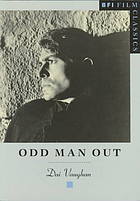










On its appearance in February 1947 the Sunday Chronicle called Odd Man Out "the best film of all time." But not everyone agreed. Edgar Anstey in the Documentary News Letter thought the film was morbid and regretted its lack of an upbeat social message.
Odd Man Out recounts the last few hours in the life of an IRA man on the run after being wounded in a disastrous robbery. Johnny roams the streets of Belfast one step ahead of the police until he is finally gunned down. Despite its setting, the film is more concerned with the metaphysical and moral dimensions of Johnny's plight than with the politics of Ireland. Though Johnny is constantly center stage, the film adopts an unusually detached stance towards him. Dai Vaughan describes with great precision how the film presents Johnny's increasing isolation and hopelessness in a series of brilliantly staged scenes.
The film united two major figures of British cinema at the height of their powers. The critical success of Odd Man Out propelled James Mason to Hollywood. Carol Reed, fresh from great acclaim for The Stars Look Down and The Way Ahead, was only two years away from The Third Man. Their collaboration in Odd Man Out marked one of the high points of postwar British cinema.

